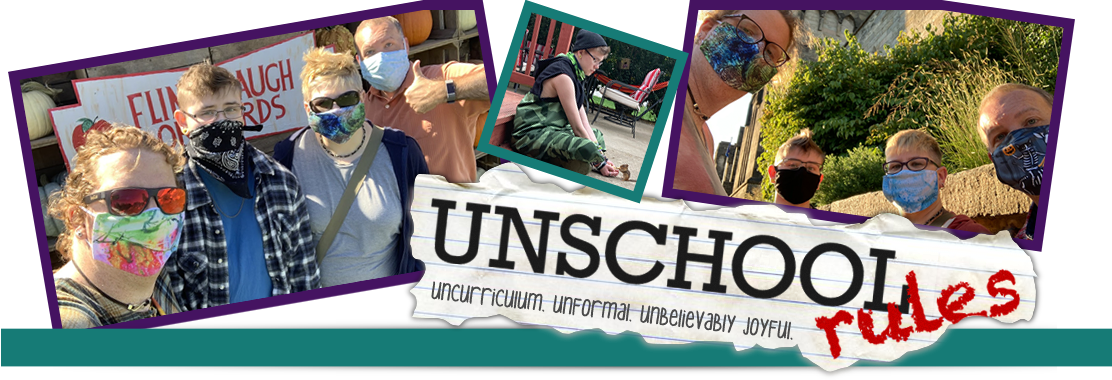I often talk about how I believe that real-world math is what matters.
You can, like our family, use an entirely real-world approach to math, with no required workbooks or textbooks. You can also use a super-structured math program. You can love math yourself, or be mystified by it. You can have a preschooler or a high-schooler, a child with math anxiety or one gifted with numbers.
In either extreme, or anywhere in the middle, I believe that knowing the real-world applications of the math you encounter is what’s most important.
While I’ve talked about this issue in many ways before, today I’d like to focus on a specific concern or question I hear, even among proponents of real-world math. Many people think it’s fine “to start with.” But the concern I hear above all others is this:
“If your daughter doesn’t learn algebra and geometry, how can she graduate?”
That’s what I want to address today, both by talking a little about our learning philosophy and by sharing some resources where you can read and explore more about math in the real world.
Real world high school algebra and geometry
First of all, I want to point something out:
“Learning algebra and geometry” is not the same thing as “working your way through an algebra or geometry textbook.” It can be, but it doesn’t have to be. In Pennsylvania, our homeschool law doesn’t even specify that you must have a whole semester or year of those subjects; you must study math in high school, and it must include algebra and geometry.
In our family, algebra happens naturally. It happens when we figure out grocery-store price comparisons. It happens when we’re keeping track of our personal finances. It happens when, as part of a summer camp on forensics, Ashar finds out that you can estimate someone’s height based on the size of their footprint.
It’s amazing the amount of times we talk about algebra in our family without ever mentioning “math.” I’ve said before that algebra is simply overlaying sets of equations onto the world around us, and the biggest thing we do to promote a real-world approach to algebra is to talk.
We talk about gas mileage in our two cars, one a decade old and the other brand new. We talk about when it makes sense to invest in something expensive – like a new microwave – and how cost-per-use works out to make it more effective to spend more money up front to spend less over time in some situations.
And geometry and its science counterpart, physics, are even more natural. Have you packed a full cart of groceries into your car’s trunk recently? Played sports? Fit things into your pantry?
These are the things we do, and the things we talk about.
And, again, what makes this work is the engagement. I’m not saying “never do math.” I’m actually saying exactly the opposite – stop relegating math to a subject on a chart for however many minutes a day. See how much of it is all around you, and share that with your kids.
It’s kind of fun. Play “spot the math” for a week, and see who can find the most examples. You might be surprised!
Real world high school math resources
- It’s not all about numbers: Unschooling math – This post came about when I tried to explain our family’s unschooling approach as it relates to the traditional subject areas most families are familiar with. It’s a great starting point and I encourage you to read it first!
- Real world math resources series – This is a starting point for most of my posts about real-world math, including the “5 Days of Real-World Math” series I wrote in 2012 and continue to add to. It breaks down the math you encounter in the kitchen, playing sports, at the grocery store, in personal finance and more.
- Real world math resources you’ll love – The final part of the series I mentioned above. I continue to add to this, and in fact need to update it with the resources I’m including today!
- The unschooled version of a ninth-grade-ish curriculum – A look at what we’re learning this year, including math, and how.
- DragonBox Algebra 12+ – An amazing way to learn algebra through an app that doesn’t even really look like algebra. This is not what I’d call an “educational game.” It’s a game. It happens to be educational. It’s also amazing. I play it too. 🙂
- DragonBox Elements – This app is the newer one from WeWantToKnow, and Ashar FLEW through the geometric concepts in it. Much like DragonBox Algebra, the point here is conceptual math, which is awesome.
- Get the Math – Dude. Rap/hip-hop style music videos showing how algebra is used in music, a video-game designer sharing how she uses math to create games, and more. Seriously cool.
- A Charlotte Mason approach to math: Living Math – This article in Homeschool magazine is by my friend Jimmie of Jimmie’s Collage, and it’s a great example of how living math happens at all levels
- Pinterest: Unschooling math – I contribute to this group board along with Aadel of These Temporary Tents and our fellow unschooling friend Mariellen. Great stuff for all ages!
- Pinterest: Unschooling high school science and math – This is a board I started this year (with contributions from my friend Karen of Homeschool Girls) to try to compile specific higher-level real world resources and conversation-starters.
- The Life of Fred book series – I’ve talked about this series often. It’s a math textbook series – sort of. It’s a story about a 5-year-old math genius named Fred, and instead of tons of exercises, it tells stories about how Fred encounters everything from arithmetic to calculus in the real world. Ashar likes reading the stories, and we highly recommend it. While this is described as a Christian series, we are a secular homeschooling family and haven’t had any problems using the fairly few spiritual references we’ve found as talking points about what different people believe, which we like to do anyway.
- Digital currency: Video games for math – This post focuses mainly on games Ashar played when she was a little younger, but it poses some questions to help you think more expansively about how math appears in your family’s favorite games.
Bringing homeschool subjects to life
This post is part of a series through the iHomeschool Network about bringing homeschool subjects to life. Click the image below to see how my blog friends bring their favorite subjects to life, from history to art to nature study and more!




We use text books for our math curriculum, but I look for real world examples to support each lesson. As my daughter entered the realm of algebra and geometry, I panicked and thought that the days of real life math would be over, but I just had to think about math differently. It’s not just about memorizing equations. That’s boring. Math is about understanding relationships between numbers and problem solving. Thanks for the great resources. I’ll be needing them!
Marci, that’s exactly it – it’s about the relationships between numbers and your life! I’m so glad you’re sharing that with your daughter!
Two of my three children has dycalculia, but the Life of Fred books allow them to glean concepts, even if they can’t make the numbers behave in their minds. It has helped them to see numbers in the “real world,” which makes them much less stressed about learning math, and they learn concepts they didn’t think they could!
Holli, isn’t that the coolest thing about those? I find I get more out of the “conceptual” stuff myself with Fred.
We’re a “relaxed homeschooling” family, gradually moving in a more unschooling direction. One of my big “aha!” moments recently around math was the realization that if it isn’t something we are actively using in our lives…it isn’t something we’re actively using in our lives I know, way to state the obvious, right? But it had never quite “clicked” with me before that any math that really is used in the real world by the average person will show up in lifestyle ways for us and, consequently, if it doesn’t, it isn’t in the category of “math that really is used in the real world by the average person.” Or, put another way, the very ability or inability to learn it without having to turn to formal, structured education IS the dividing line between what is and isn’t essential for normal adult life.
That’s a GREAT way to put it! If you’re going to use it… you’re using it… so… 🙂